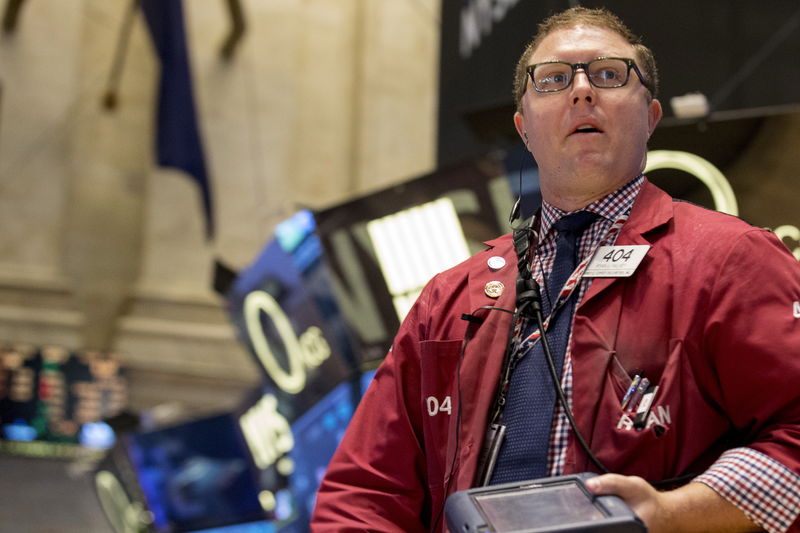Investing.com - Here are the top five things you need to know in financial markets on Tuesday, August 6:
1. U.S. labels China “currency manipulator”
The U.S. Treasury officially labeled China as a currency manipulator after the People’s Bank of China allowed the Chinese yuan to fall below 7 per dollar on Monday in response to U.S. President Donald Trump’s threat to impose new tariffs.
The U.S. decision is the first such action since 1994 and initially sent both the onshore and offshore yuan to multi-year lows amid a growing trade conflict that has spooked markets.
The currency weakened further on Tuesday before recovering, as the PBoC set a firmer-than-expected yuan fixing and also announced the issuance 30 billion of yuan bills. The amount is larger than needed to replace maturing debt, and so tightens the local supply of yuan, supporting the currency's price.
2. Global stocks mixed as equities struggle to recover
Global stocks traded mixed as escalating trade tensions between the U.S. and China continued to reverberate through markets.
Asian equities ended sharply lower, following the worst slide in the Dow so far this year with losses of their own.
European stocks bounced back after their largest two-day decline in over three years, with a better-than-expected reading of German factory orders helping to stabilize sentiment.
U.S. futures also pointed to a higher open despite the ongoing trade turmoil. The focus will likely remain on the conflict in a session with few major economic reports beyond the Job Openings and Labor Turnover survey for June. Amid a smattering of U.S. earnings reports, Walt Disney (NYSE:DIS) will likely take the spotlight after the market close with a report that will detail the success of "Avengers: Endgame" and a jump in attendance at Disneyland.
3. Oil rises as U.S. ups ante on Venezuela
Oil traded higher after the U.S. increased pressure against Venezuela, declaring a total economic embargo against the country.
President Trump signed an executive order late Wednesday freezing all of the government’s assets and prohibiting transactions with the country, unless specifically exempted.
OPEC's latest monthly report showed that international pressure contributed to Venezuela’s oil output falling by nearly half last year.
Also supporting prices, the U.K. opted late on Thursday to join the U.S. in a naval mission designed to protect oil tankers in the Strait of Hormuz, a key shipping point for the world’s oil supply.
4. Bezos sells $2.8 billion in Amazon (NASDAQ:AMZN) stock
Amazon.com (NASDAQ:AMZN) Chief Executive Officer Jeff Bezos sold $990 million worth of shares in the company last Thursday and Friday.
According to regulatory filings, Bezos previously offloaded an additional $1.8 billion in shares in the last three days of July, taking the total value of shares sold last week to $2.8 billion.
The move goes beyond a previously announced trading plan. Bezos had indicated that he would sell about $1 billion in Amazon (NASDAQ:AMZN) stock each year in order to fund his rocket company Blue Origin. He also pledged $2 billion to a charity last year focused on homelessness and education. He still retains a stake of some 12% in Amazon, worth over $100 billion at current prices.
5. Former Fed chairs argue for central bank independence
The four living former heads of the Federal Reserve - Janet Yellen, Ben Bernanke, Alan Greenspan and Paul Volcker - took it upon themselves to argue for the central bank’s independence from political pressure.
After more than a year of repeated attacks from President Trump on the Fed claiming that rates should be lower, the four former Fed officials co-signed an op-ed for The Wall Street Journal that argued the central bank should “make decisions based on the best interests of the nation, not the interests of a small group of politicians.”
After the Fed lowered interest rates by a quarter-point in July, Trump insisted it should have done more, saying that the current Fed chair Jerome Powell "let us down." Markets have already priced in an additional 25 basis-point cut in September, although recent tensions with China have pushed expectations for a full half-point cut higher this week.
Current St. Louis Fed President James Bullard will speak on the U.S. economy and monetary policy at 1:05 PM ET (17:05 GMT).
